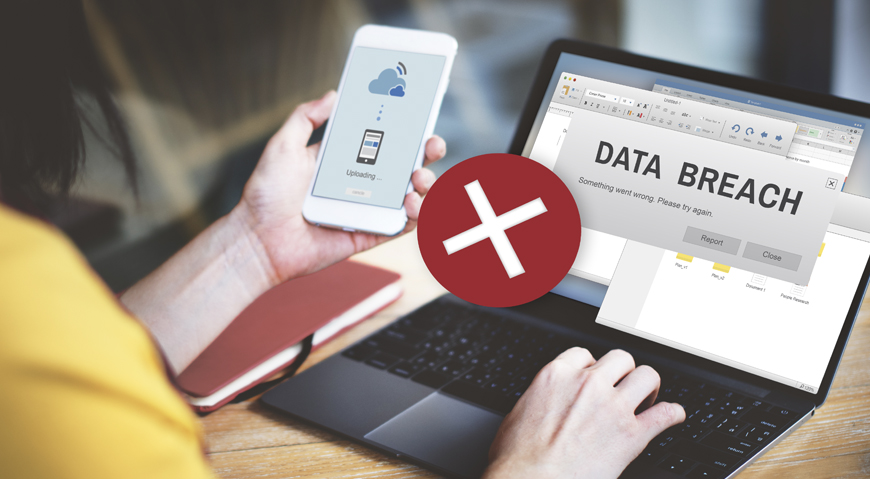Running a business without adequate data security is a massive risk.
Crippling data breaches are increasingly common and no business is immune. In 2018, Dubai’s fastest growing startup – Careem – was hit by a cyberattack affecting 14 million users.
SMEs are especially vulnerable to attack. Without adequate information and network security you risk damaging your profits and reputation.
The good news is you can greatly reduce the risk of attack with a few cost-effective security measures such as restricting data access and ensuring adequate monitoring.
Here are five ways to protect your data from getting into the wrong hands:
1. Role-based access
Control who gets access to your data
Employees are viewed by cybercriminals as the path of least resistance into a business, according to global cybersecurity company Kaspersky.
To minimise risk, you need to make sure only authorised employees have access to your data and that you have adequate information and network security.
Role-based access control (RBAC) is a cost-effective method to determine who gets access to what data depending upon their role in the company. Benefits include low maintenance costs and increased efficiency.
With RBAC, you can restrict data access to what’s necessary for an individual to do their job. This can helps prevent information from being leaked – a significant threat to data security.
In a survey of more than 200 organisations worldwide, 69% of respondents revealed they have experienced an attempted or realised data theft or corruption by corporate insiders. RBAC reduces the risk of data getting into the wrong hands.
To reduce complication and costs, it’s important to tailor RBAC to your company’s business model and security risk.
Start by creating a list of every software, hardware and app with some sort of security such as a password. Clarify every employee’s role and create a policy explaining how RBAC is to be used. Don’t forget to continually adapt it as your business evolves.
2. Employee education
Tighten cyber security by training staff on security measures

One of the top causes of data breaches is careless or uninformed employee actions. Cybercriminals know that, and they use it to their advantage.
Human error is more likely to cause a security breach for companies in maturing economies. To counter the threat, approximately 9 in 10 firms are now employing security training to assess or improve knowledge among employees.
One wrong click on a virus-infected email could endanger your entire business network. To reduce the risk of this happening, it’s important to train staff to identify phishing emails (fraudulent emails to gain access to sensitive information) and emails containing attachments sent from strangers.
Employees should also be educated on safe internet navigation, effective passwords and the use of mobile devices. A well-trained workforce could protect your bottom line.
3. Remote monitoring
Keep watch on cyber threat 24/7
When Dubai-based ride-hailing app Careem was hit by a cyberattack in 2018, access was gained to a computer system that stored customer and driver account information. Attacks such as this highlight the need to monitor your company’s network at all times.
Downtime can be extremely costly to a business. Remote monitoring provides 24/7 cover, allowing your IT team to stay on top of incidents at all times.
Your servers will be on watch 24/7 so that the moment a potential problem arises it can either be resolved automatically or escalated and addressed remotely.
A cost-effective option is to work with a managed IT services provider (MSP) to maintain continuous remote monitoring of your company’s network. This allows your IT staff to focus on core activities.
Quality MSPs should be available at all times to receive immediate notifications of potential data security threats, and to respond in the appropriate way.
4. Data backup and recovery
Protect against loss of data and what to in an attack

Data backup is a must if you want to protect your business against data loss but what happens in the event of a natural disaster, server crash, power outage or human error or deliberate attack?
A data backup and recovery strategy can protect your business against data loss and reconstruct your database in the event of a disaster.
To ensure data continuity, it is vital to replicate and host your data on backup servers. Your strategy should include:
- Planning and testing responses to different kinds of failures
- Configuring the database environment for backup and recovery
- Setting up a backup schedule
- Monitoring the backup and recovery environment
- Troubleshooting backup problems
- Recovering from a data loss
To save time and money, consider working with an IT specialist that provides regular, remote backup using an automated system.
Remote data backup you can rest assured knowing that your data is protected, backed up, and up-to-date.
5. Endpoint and edge protection
Invest in software to prevent accidental or deliberate data breaches
Endpoint protection software prevents end-users from accidentally causing a data breach by blocking access to an unsecured web page.
Endpoint security should protect all endpoints – servers, desktops, laptops, smartphones and other devices connected to your IT network.
Edge protection blocks harmful websites or emails from entering your network though the use of firewalls, spam filters and web filters. If malicious data does get through to your system, end-point protection software should immediately disable it.
Used together, endpoint and edge protection software are a relatively simple and low-cost way to provide efficient, effective and easier security management.
Protecting your business from data breaches and minimizing disruption in the event of a disaster should be a priority from the outset.
However, implementing the right level of data protection for your business, and managing it effectively, isn’t always easy, especially for small companies.
To ensure you have adequate protection, consider outsourcing all or part of your data security requirements to a proven managed service provider (MSP).
An MSP can represent a more cost-effective and hassle-free way to ensure your data is protected, allowing you to focus on the smooth-running of your business.
Setting up your own business has never been easier. Virtuzone takes care of it all so you can focus on what matters – building your business. For more information about company formation in the UAE mainland or free zones, please call us on +971 4 457 8200, send an email to info@virtuzone.com, or click here.









